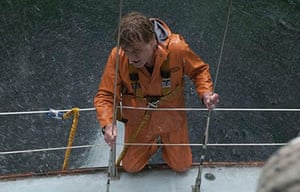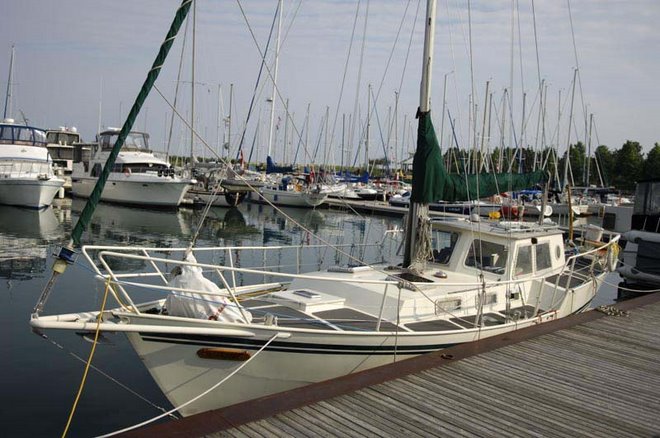 |
| It's like there hasn't been a clearance sale at West Marine since 1980. |
Darwin denied his due. That's what I thought, probably with characteristic harshness, while watching the survival film All is Lost, which has been widely admired as both a technical tour-de-force and a heartwarming triumph of acting for Robert Redford, nameless aside from a credit calling him "Our Man". R.R., all craggy and sun-aged, at least has a boat of his own vintage: a typically worn, late '70s Cal 39 that looks as if it was last updated in '81, right down to the brown plaid cushions. It looks fitted out for Lake Ontario on a 15-knot day. It does not appear to be adequate for solo sailing in the Indian Ocean. The two are different activities. Significantly so.
My wife and I watched this film with some trepidation; we suspected it would, like almost every sailing narrative film we know of, be a little slack on the seamanship details, and in this we were not disappointed, except that we were. Again.
When one is a person who is trying to live his or her passion, and, intending to continue to live, has internalized those habits of mind and of safety best suited to keeping them alive, it's clear that when one is watching a movie that takes unnecessary shortcuts with reality, the effect can be jarring and can take you out of the narrative flow of the movie.
The experience of watching the dramatic and admittedly well-shot (and good sounding; we thought the sound effects were well-composed and mostly "realistic") visuals was therefore akin for these sailors to telling a martial artist to "fall awkwardly" after years of doing breakfalls: it's incredibly difficult to remember how to do things wrong when doing them right is internalized!
Warning, loads of spoilers ahead: Some clangers that killed the narrative thrust of All is Lost include a scene, for instance, where Our Man's fallen mast is freed by a couple of swipes of a blade through a halyard; both my wife and I said simultaneously "where's the bolt cutters?" Why did he not lift up his flaming half-jerrycan of burning paper, or have it held over the water? Where was his pump handle? Where was his bucket? Where were his ditch bag and EPIRB? Where was his PFD or his jacklines? Why did he sail on port, bringing in yet more water that overtopped his batteries (I assume) to get back to his sea anchor? He could have "chicken-gybed" on starboard to get to the same place! I'm not even sure that a Cal 39 would stay inverted given its ballast ratio.
I could go on. And on. You get the drift.
 |
| Foulie play: Our Man must have superheroic upper-body strength...and lifelines don't work that way. Jackstays do. |
Sure, it's easy to be critical, and it's easy to acknowledge that stressed people screw up things that should be ingrained, but the overall impression is that whatever other qualities "Our Man" had that (ultimately) led to his survival, preparedness and basic seamanship were not uppermost. At sea, you make your own luck (John Vigor's black box theory). Active prep is superior to reactive MacGyvering.
And that is what took us crash-gybing right out of a film that could have been better if it didn't star a non-sailor, and hadn't been written by a weekend sailor. There were things shown that wouldn't have made sense to a general audience (how a sea anchor works, for instance), and other things not shown that made a sailing audience cringe. I would say it's the recent immersion in all things RYA that might have made me more touchy, but I think I would have been about 80% bugged by this film even 10 years ago, when I had fewer sea hours and much, much more to learn about safety and seamanship.
 |
| Now, where did I leave my ditch bag? Never mind, I look fabulous for 77! |
Coincidentally, we also saw Gravity last week, which one Web wag dubbed All is Lost in Space, and while that film was even more impressive than All is Lost (or at least, less familiar) in terms of visuals, the problems for us were the same: the idea that three space stations and the Hubble orbit at the same altitude (also the same altitude and vector as satellite debris, apparently) and within sight of each other wrecked that film for me, as well. Space doesn't work that way, and neither does single-handed sailing, as depicted in All Is Lost. The fudging or the actual wrongness of the details treat the suspension of disbelief like the cratering of the bridge over Tacoma Narrows. Sailors can't bear the goofs, and non-sailors won't realize they are watching How Not to Do It: Marine Edition.




